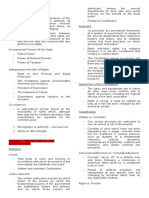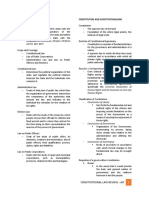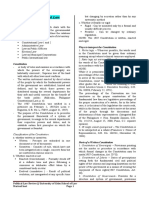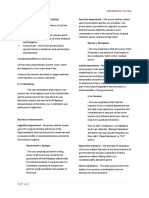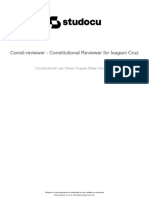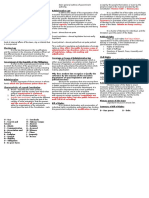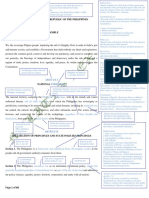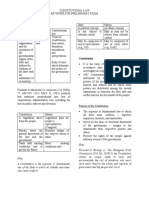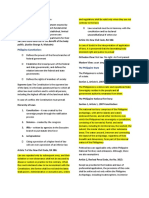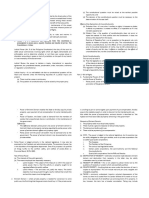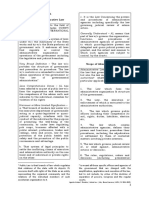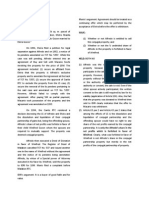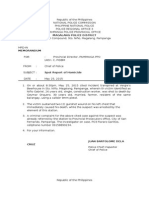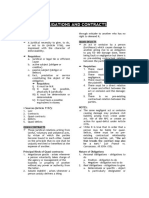0 ratings0% found this document useful (0 votes)
110 viewsI. Preliminary Considerations: Meaning Except Where Technical Terms
I. Preliminary Considerations: Meaning Except Where Technical Terms
Uploaded by
Jane Irish GaliciaThis document provides an overview of political law and constitutional law concepts. It discusses that a constitution is the fundamental law that establishes the framework and principles of a government system. It also establishes that a constitution is the supreme law of the land that all other laws and actions must be measured against. The document then defines the key elements that comprise a state, including a people, territory, and government. It notes that the Philippines has a democratic republican form of government under a presidential system.
Copyright:
© All Rights Reserved
Available Formats
Download as DOCX, PDF, TXT or read online from Scribd
I. Preliminary Considerations: Meaning Except Where Technical Terms
I. Preliminary Considerations: Meaning Except Where Technical Terms
Uploaded by
Jane Irish Galicia0 ratings0% found this document useful (0 votes)
110 views14 pagesThis document provides an overview of political law and constitutional law concepts. It discusses that a constitution is the fundamental law that establishes the framework and principles of a government system. It also establishes that a constitution is the supreme law of the land that all other laws and actions must be measured against. The document then defines the key elements that comprise a state, including a people, territory, and government. It notes that the Philippines has a democratic republican form of government under a presidential system.
Original Description:
Constitutional Law 1 Reviewer
Original Title
Consti Reviewer
Copyright
© © All Rights Reserved
Available Formats
DOCX, PDF, TXT or read online from Scribd
Share this document
Did you find this document useful?
Is this content inappropriate?
This document provides an overview of political law and constitutional law concepts. It discusses that a constitution is the fundamental law that establishes the framework and principles of a government system. It also establishes that a constitution is the supreme law of the land that all other laws and actions must be measured against. The document then defines the key elements that comprise a state, including a people, territory, and government. It notes that the Philippines has a democratic republican form of government under a presidential system.
Copyright:
© All Rights Reserved
Available Formats
Download as DOCX, PDF, TXT or read online from Scribd
Download as docx, pdf, or txt
0 ratings0% found this document useful (0 votes)
110 views14 pagesI. Preliminary Considerations: Meaning Except Where Technical Terms
I. Preliminary Considerations: Meaning Except Where Technical Terms
Uploaded by
Jane Irish GaliciaThis document provides an overview of political law and constitutional law concepts. It discusses that a constitution is the fundamental law that establishes the framework and principles of a government system. It also establishes that a constitution is the supreme law of the land that all other laws and actions must be measured against. The document then defines the key elements that comprise a state, including a people, territory, and government. It notes that the Philippines has a democratic republican form of government under a presidential system.
Copyright:
© All Rights Reserved
Available Formats
Download as DOCX, PDF, TXT or read online from Scribd
Download as docx, pdf, or txt
You are on page 1of 14
I.
PRELIMINARY CONSIDERATIONS meaning except where technical terms
are employed
POLITICAL LAW – Branch of public law Ratio Legis Est Anima – Where there
which deals with the organization and is ambiguity, the words of the
operation of the governmental organs of the constitution should be interpreted in
State and define the relations of the state accordance with the intent of its framers
with the inhabitants of its territory Ut Magis Valeat Quam Pereat – The
o Constitutional Law – treats of the constitution is to be interpreted as a
nature of constitutions, and the whole
validity of the legal enactments as The historical background and the
tested by the criterion of their underlying rationale for the inclusion
conformity to the fundamental law of certain provisions should be
o Administrative Law – treats of that considered. “Intended to endure for
part of public law which fixes the all ages to come”
organization of government,
determines the competence of the *In regarding: Immediate application of the
authorities that execute the law, and Constitution
indicates to the individual the – GR: The provisions of the Constitution are
remedies for violation of his rights considered SELF-EXECUTING and do not
require future legislation for their enforcement
CONSTITUTION (FUNDAMENTAL LAW) - Right to Information
– Provide a higher law by which all other - (Section 11, Article 12): limiting foreign
laws, rules and government actions may ownership of capital of public utilities
be measured against - Right to Health
– Foundation of entire legal system, - NON SELF-EXECUTING: Used by the
bedrock of legal order judiciary as aids or as guides in the exercise of
– Social contract whereby the people its powers of judicial review, and by the
have surrendered their sovereign legislature in its enactment of laws (If unheeded,
powers to the state for common good the remedy will not lie with the courts; rather, the
– SUPREME LAW OF THE LAND electorate’s displeasure may be manifested in
their votes
- Article 2 (State Principles and Policies)
DOCTRINE OF CONSTITUTIONAL
- Article 13 (Social Justice and Human
SUPREMACY
Rights)
– The fundamental and paramount law of
the nation
_____________________________________________
– It prescribes a permanent framework of
a system of government, assigns to the
different departments their respective II. THE STATE
powers and duties, establishes certain
fixed principles on which government is STATE
founded - Entity, which has been referred to as BODY
– IF A LAW/CONTRACT VIOLATES any POLITIC, or society of men, united together
norm of the constitution, that for the purpose of promoting their mutual
law/contract whether promulgated by safety and advantage by joint efforts of their
the legislative or by executive branch or combined strength
entered into by private persons for - Community of persons more or less
private purposes is NULL AND VOID numerous, permanently occupying a definite
WITHOUT ANY FORCE AND EFFECT portion of territory, independent of external
– North Star, the compass, by which control, and possessing an organized
judiciary is guided in resolving the often government to which the great body of
complex and labyrinthian legal issues inhabitants render habitual obedience
presented before it
– PEOPLE POWER CHARTER ELEMENTS OF A STATE
– PH has written constitution: enacted at a People – Sufficient enough to be self-
particular time sustaining but not so much as to be
incapable of governance, there is really
PRINCIPLES OF CONSTITUTIONAL no set rules as to number
CONSTRUCTION
Verba Legis – The word used in the Territory
constitution must be given the ordinary – State must have a definite place to call
its own, a space consisting of land
(terrestrial), the waters (fluvial: rivers,
maritime: sea) around it, airspace Government
(aerial) above the territory – Entity which exercises power and with
– The national territory comprises the appropriate authority to enforce and
Philippine archipelago, with all the command obedience from people
islands and waters embraced therein, – That institution or aggregate of
and all other territories over which the institutions by which an independent
PH has sovereignty or jurisdiction, society makes and carries out those
consisting of its terrestrial, fluvial, and rules of action which are necessary to
aerial domains, including its territorial enable men to live in a social state, or
sea, the seabed, subsoil, insular which are imposed upon the people
shelves, and other submarine areas. forming that society by those who
The waters around, between, and possess the power or authority of
connecting the islands of the prescribing them
archipelago, regardless of their breadth – PH is a democratic republican state, has
and dimensions, form part of the internal presidential type of government
waters of the PH – FUNCTIONS OF GOVERNMENT
– PH territory includes those areas which a. Constituent: those which constitute
were ceded to the US by Spain under the very bonds of society and are
Treaty of Paris (10 Dec 1898: PH compulsory in nature (promote
Islands) and Treaty Between Spain and government’s objectives as
the US (7 Nov 1900: Cagayan, Sulu, expressed in our Constitution and
Sibuto) and Treaty Between the US and which are exercised by it as an
Great Britain (2 Jan 1930: Turtle and attribute of sovereignty)
Mangsee Islands). Moreover Batanes, b. Ministrant: those that are
those belonging by historic right or legal undertaken only by way of
title, and the KIG advancing the general interest of
society, and are merely optional
ARCHIPELAGIC DOCTRINE – Concept which (government may exercise to
considers the ENTIRE ARCHIPELAGO as one promote merely the welfare,
integrated cohesive unit of territory, not as progress and prosperity of people
comprising various disparate and separate like GOCCs)
islands. Straight baselines are drawn joining the – LEGAL AUTHORITY:
outermost points of the outermost islands and a. De Jure (by law): government is
drying reefs of the archipelago rightfully and legally in possession
A. Extent of different maritime zones – of the powers
Territorial sea, contiguous zone, and b. De Facto (in fact): government of
exclusive economic zone paramount force
B. RA 9522 (adjustment of PH
archipelagic baselines) PARENS PATRAE – The State as the parent or
- Territorial waters (12NM from guardian of the country and the people. The
baseline): exercise of sovereignty government has the obligation of protecting the
- Contiguous Zone (24NM from less fortunate members of society who could not
baseline): jurisdiction to enforce otherwise stand for themselves
customs, fiscal immigration, and
sanitation laws (Art 33) INHERENT AND FUNDAMENTAL POWERS –
- Exclusive Economic Zone (200NM exist by the mere fact that the state has come to
from baseline): right to exploit living and being
nonliving resources A. Police Power
– Power used to promote the public
-Terrestrial domain or land area: By welfare by restraining and regulating
Military Bases Agreement, it should be liberty and the use of property
noted, the PH government merely – To invoke the exercise of police power
consents that the US exercises (1) not only must it appear that the
jurisdiction in certain cases. “consent interest of the public generally requires
was given purely as a matter of comity, an interference with private rights, (2)
courtesdy, or expediency over bases as but the means adopted must be
part of the PH territory or divested itself reasonably necessary for the
completely of jurisdiction over offenses accomplishment of the purpose and not
committed therein” unduly oppressive upon individuals
– Salus Populi Est Suprema Lex: the
welfare of the people is the supreme
law. Connotes the power to make, to improve the lives of people and
ordain, and establish all manner of enhance their moral and material values
wholesome and reasonable laws, – The exercise of power to tax constitutes
statutes and ordinances, either with a deprivation of property under Due
penalties or without, not repugnant to Process Clause, and the taxpayer’s right
the Constitution, as they shall judge to to due process is violated when arbitrary
be for the good and welfare of the or oppressive methods are used in
commonwealth, and for the subjects of assessing and collecting taxes
the same – It is also inherent limitation that the
– Basically lodged in Congress. It may be power to tax proceeds will be for a
delegated to the President, PUBLIC PURPOSE: It does not only
administrative agencies, and local pertain to those purposes traditionally
governments but only until the extent of viewed as essentially government
their authority functions, such as building roads and
– Police power to local governments: delivery of basic services, but also
General Welfare Clause includes those purposes designed to
– MMDA: No police power has been promote social justice (relocation of
delegated yet, administrative in nature illegal settlers, low-cost housing and
B. Eminent Domain urban agrarian reform). PUBLIC
– Authority to take what the government PURPOSE IS THE HEART OF A TAX
needs provided that it is for public use LAW
and that there is just compensation – Motivation behind many taxation
– It is a form of forcible taking justified by measures is the implementation of
the higher purpose to be sub-served by police power goals
the property in government hands or – Power to tax resides in legislature: the
other authorized entity – it represents ones who determine whom or what to
“the ultimate right of the sovereign tax, how much to tax
power to appropriate any property within – LGUs have the power to tax given by
its territorial sovereignty for public the Constitution, but it is limited
purpose thru a method that partakes the
nature of compulsory sale” Sovereignty
– Lodged in the Congress. May be – Supreme power of the State to
exercised by others through valid command and enforce obedience, the
delegation. Legislature has delegated power to which, legally speaking, all
the power to the President, LGUs, some interests are practically subject, and all
public entities, and private corporations wills subordinate
engage in public service (electricity, – Legal: authority based on the law
water, telecommunications, etc.) – Political: authority of people themselves
– Eminent domain requires just – Internal: ability of the State itself to have
compensation but police power (on its wills imposed and followed by all
taking of land) does not those within its jurisdiction
C. Taxation – External: independence from an outside
– In exchange for the protection extended authority
by the State to the taxpayers, the Not necessarily complete freedom
government collects taxes as source of because of auto-limitation (State
revenue to finance its activities may agree to some restrictions on
– The power to tax is a necessary what it may or may not do in
attribute of a viable society, and as consistent with self-interest dealing
taxes are what the people pay for a with other States)
civilized society, they constitute the Almost every time a state enters into
lifeblood of a nation an international agreement, it
– Power of the state to impose a charge voluntarily sheds off part of its
or burden upon person, property, or sovereignty
property rights for the use and support – Sovereignty is characterized by
of government permanent, exclusive, all-
– Despite the natural reluctance to comprehensive, inalienable,
surrender part of one’s hard-earned imprescriptible, indivisible and absolute
income, every person who is able must
contribute, The government, in return, is DOCTRINE OF ACT OF STATE
expected to respond in the form of - The acts of a state may not be questioned in
tangible and intangible benefits intended any other state. “Every sovereign state is
bound to respect the independence of every
other state, and the courts of one country – Suits against the State may be allowed
will not sit in judgment on the acts of the if: (1) if it gives its consent, (2) waives its
government of another, done within its immunity
territory” – Waiver may be in the form of:
- States prevent their national courts from A. Express: must come from
deciding disputes which relate to the internal Legislature in the form of a general
affairs of another State, the other two being law or special law
immunity and non-justiciability B. Implied: when State enters into a
- When there is change of sovereignty, the contract or commences litigation. It
political laws are deemed abrogated is also implied when the government
EXCEPT: if they are among “that great files a complaint, opening itself to a
body of municipal law which regulates counterclaim (in between sovereign
private and domestic rights", they or governmental function and
continue to be in force until repealed by proprietary or commercial activities,
present Government the former has the power to waive
its non-suability)
STATE (SOVEREIGN) IMMUNITY As for filing complaint by
– Attribute of being non-suable, as a government: suability will result only
general rule. The Constitution declares, where the government is claiming
”The state may not be sued without its affirmative relief from defendant
consent”. There can be no legal right as With regard to contracts: it does
against the authority that makes the law not mean that sovereign states may
on which the right depends be sued in local courts at all time
JURE IMPERII VS JURE GESTIONIS
DOCTRINE OF STATE (SOVEREIGN) - Jure Imperii: Sovereign or
IMMUNITY governmental activities
Royal Prerogative of Dishonesty: “the - Jure Gestionis: Commercial, private,
privilege it grants the state to defeat any and proprietary acts (mantle of state
legitimate claim against it by simply immunity cannot extend in this act)
invoking non-suability” may be abused RESTRICTIVE THEORY: came
– Applies in regard to suits against the about when government enters into
government itself, or any of its purely commercial activities remotely
UNINCORPORATED AGENCIES (they connected with the discharge of
have no independent personality, they governmental functions
are part and parcel of government itself) – When the government itself INITIATES
Only true for agencies not THE SUIT and enters into Compromise
performing proprietary functions Agreement:
– The defense of state immunity from suit It thereby descends to the level of
does not apply in causes of action which private individual and thus opens itself
do not seek to impose a charge or to whatever counterclaims or defenses
financial liability against the State the latter may have given against it. The
(preliminary injunction or mandamus) State may be sued even without its
– INCORPORATED AGENCIES: express consent because by
government-owned or controlled ENTERING INTO A CONTRACT the
corporations are considered separate sovereign descends to the level of a
and distinct from government itself citizen
They could not invoke doctrine of – The doctrine of governmental immunity
state immunity from suit cannot serve as an instrument
– Applies also to complaints filed against perpetrating an injustice on a citizen
officials of the state for acts allegedly
performed by them in the discharge of SUABILITY OF LOCAL GOVERNMENTS
their duty – Local Governments are separate and
Government officials cannot hide distinct personalities that allow them to
behind the doctrine if they are being sue and be sued given by their
sued for having exceeded the CHARTER
powers conferred upon them or – They cannot invoke the doctrine of non-
abused their authority, or sued in suability
their personal capacity.
“Unauthorized acts of government
officials are NOT ACTS OF THE
STATE”
SUABILITY AND LIABILITY – Does not necessarily imply or mandate
– Waiver of sovereign immunity does not the setting up of absolute walls because
amount to acknowledging liability. It only the Constitution blends, as well as
means the state allows the suitor to separates the powers in its effort to
prove his case in court create a government that will work for,
– Suability: The consent of the state to be as well as protect the liberties of, its
sued citizens (there is intermingling concerns
– Liability: Applicable law and the as well as sharing responsibilities)
established facts – The rule is SEPARATION AND
COOPERATION, not mutual
JUDGEMENTS AND EXECUTION antagonism
– If the state is proven to be liable, then – This principle creates a crafted system
that would necessitate another consent of checks and balanced powers within
on the part of the government each branch
– Government funds and properties may – Powers has to work with the other
not be seized under writs of execution or branches to enable the State to move
garnishment to satisfy such judgment, forward to bring about the kind of
thus the power of the Court ends when policies and programs that would benefit
judgment is rendered the people
– Execution could be had as a matter of – In case of conflict, the JUDICIAL
course, there must be appropriation by DEPARTMENT is the only constitutional
Congress to satisfy the same (same organ which can be called upon to
goes with LGUs) determine proper allocation of powers
– Mandamus could be resorted for the between the several departments and
purpose of having a local government among the integral or constituent units
pay what has been adjudicated against thereof
it Constitution adopted the American
type: where written constitution is
_____________________________________________ interpreted and given effect by the
judicial department
III. POWERS SEPARATE, BALANCED – Executive Department: powers of the
President under the Constitution, such
AND NON-DELEGABLE
as power to appoint, control and
There is a need to institute a system by
supervise, as well as executive
which the people are protected against
clemency, and prerogative to command
possible abusive, oppressive, and tyrannical
the armed forces. Ascendancy in foreign
exercise of power
relations has been recognized, as he is
This is done through powers being
the face of the nation. The Congress
distributed and not concentrated in the
participates in the role of dealing with
hands of an official or group of officials
international community since its
(providing a counterbalance and check on
enactments could affect the ability of the
the others)
president
PRINCIPLE OF NON-DELEGATION OF
– There is a violation od the principle
POWERS: Each branch must discharge and
when there is impermissible (a)
exercise its powers and authority as its own
interference with and/or (b) assumption
responsibility for which it is accountable and
of another department’s function
not try to pass it on to others
EXECUTIVE V. LEGISLATIVE POWERS AND
PRINCIPLE/DOCTRINE OF SEPARATION OF
FUNCTIONS
POWERS
– The exercise of emergency powers,
– Governmental powers are distributed
such as the taking over of privately
among the three branches:
owned public utilities or businesses
1. Legislature: Congress as the
affected with public interests, require a
repository of this power, enacts
delegation from Congress which is the
laws with the authority to amend or
repository of emergency powers
repeal them
(Section 17, Article 12)
2. Executive: President as
Without any authorization from
embodiment of this power,
Congress, the President could not
executes and enforces the law
exercise such a power
3. Judiciary: The courts are vested
The President’s power must stem
with the power to interpret and
either from an act of Congress or from
apply the Constitution and the laws
the Constitution itself. The Constitution
limits his functions in the lawmaking may or may not be done, thus somehow
process to the recommending of laws he making or unmaking the law but must
thinks wise and vetoing of laws he also be careful so as not to cross over
thinks bad and transform interpretation construction
– When it comes to money matters, the into judicial legislation
Congress raises and spends through – The Court simply applies the law no
the power of taxation and the power to matter that they might have misgivings,
appropriate funds. The President simply UNLESS it falls within the context of
carries out the policy decisions made by constitutionally proscribed statutes such
the legislature as to who or which and as when it prescribes excessive, cruel
how much to tax as well as in the and inhuman punishments
implementation of laws providing money – The Court should not pre-empt
to be spent for specified purposes Congress and usurp its inherent powers
– The enforcement of the national budget, of making and enacting laws
as primarily contained in the GAA, is Court does not have the unbridled
indisputably a function assigned to the authority to rule on just any and every
Executive branch claim of constitutional violation (Imbong
Budget execution: covers various v. Ochoa)
operational aspect of budgeting, – The Supreme Court and its members
includes the evaluation of work and should not and cannot be required to
financial plans for individual activities, exercise any power or to perform any
and the regulation and release of funds trust or to assume any duty not
as well as other related activities pertaining to or connected with the
– Upon approval and passage of GAA, administering of judicial functions
Congress’s role comes to an end and If a member of Supreme Court sits as
from there, the Executive’s board of arbitrators, he cannot act in
implementation on National Budget behalf of Supreme Court as a whole
begins – With regard to administrative agencies
– From the moment the law becomes which have been vested with quasi-
effective, any provision of the law judicial functions: “administrative
that empowers Congress or any of its agencies are NOT considered courts;
members to play any role in the they are neither part of the judicial
implementation or enforcement of the system nor deemed judicial tribunals”
law violates the principle of – In vesting the Supreme Court the power
separation of powers, and deemed to promulgate rules concerning the
unconstitutional protection and enforcement of
– Informal practices, through which constitutional rights, pleadings, practice,
legislators have effectively intruded into and procedure in all courts (1935
the proper phase of budget execution, Constitution), admission to practice of
must be deemed as acts of grave law, the Integrated Bar and legal
abuse of discretion assistance to the unprivileged (1973
– The power to spend public wealth Constitution), the 1987 Constitution took
resides in CONGRESS and not in the out the authority of Congress to repeal,
Executive alter, or supplement the laws “and
Generate money for the government, enhanced the rule making power of this
appropriate public funds, and spend the court”
money SUBSTANTIVE LAW VS. PROCEDURAL
Two principles of appropriation: MATTER
1. Principle of Public Fisc – all - Procedural is the Court’s domain while
monies received from whatever Substantive is the domain of Congress
source is public funds - When it comes to court fees, it is in the
2. Principle of Appropriations domain of Supreme Court
Control – prohibiting Legal fee is a vital component of the
expenditure without legal riles promulgated by this Court, cannot
authorization be changed by Congress
The other branches trespass upon
JUDICIAL, ADMINISTRATIVE, AND this prerogative if they enact laws or
POLITICAL POWERS AND FUNCTIONS issue orders that effectively repeal, alter
– Judicial branch: interprets and applies or modify any of the procedural rules of
the law, declare what laws or acts of this Court
other branches of government are
constitutional/legal, pronounces what
– EXECUTIVE CLEMENCY (prerogative separate, co-equal, coordinate and
to grant pardons) is the exclusive and supreme within its own sphere, under the
prerogative power of the President legal and political reality of one
The powers of the 3 branches to save overarching Constitution that governs
life of a death convict do not exclude one government and one nation for
each other for the simple reason that whose benefit all the three separate
there is no higher right than the right to branches must act with unity
life Keep the different branches within the
– Policy Determination is the job for exercise if their respective assigned powers
Congress. This means that the Court and prerogatives through RULE OF LAW
cannot render judgment in the absence PRINCIPLE OF COMITY
of a law governing the certain issue Practice of voluntary observing inter-
departmental courtesy in undertaking their
COMMUNICATIONS AND DELIBERATIONS assigned constitutional duties for the same
PRIVILEGED harmonious working of government
– There are certain things that cannot be
disclosed to one of the branches to the CHECKS AND BALANCES
other branches (executive, legislative, – Branches of the government also serve
and judicial privileges) as a counterweight and check on the
Essential to protect the independence exercise of the powers and functions of
of decision-making of those tasked to the other branches
exercise Presidential, Legislative and – Power of Judicial Review: power of
Judicial power the judiciary to determine the validity of
– Executive privilege may be invoked the other branches
which would have the effect of – Political Question Doctrine: limitations
exempting the executive from that are set out
disclosure. This extends not only to – Each repository or holder of power
military and diplomatic secrets, but also could, in the exercise of its prerogative,
to documents integral to an appropriate hold itself as a counterweight or
exercise of the executive’s domestic checking mechanism on the exercise by
decisional and policy making functions the other branches of their assigned
2 kinds of executive privilege: power
1. Presidential Communications: – Monitor, inquire, or check into what the
decision making of the President other branch or departments are doing
2. Deliberative Process: decision and undertake whatever it might find to
making of executive officials be erroneous by the other departments
(operational proximity to the and thereby maintain the balance or
President) equilibrium in the governmental
– The extraordinary character of the structure
exemption indicates that
presumption inclines heavily against SYSTEM OF CHECKS AND BALANCES
executive secrecy and in favor of – Each branch could not just do whatever
disclosure it wants if the other branch would find
– Elements of Presidential the act unwarranted, unwise, or
Communications Privilege: downright unconstitutional
1. Must relate to a quintessential and
non-delegable presidential power POLITICAL QUESTION DOCTRINE AND
2. Communication must be authored or JUDICIAL REVIEW
solicited and received by a close o Judicial Review:
adviser of the President or himself. - Essentially the maintenance and
3. Remains a qualified privilege that enforcement of the separation of
may be overcome by a showing of powers and the balancing of powers
adequate need, such that the among the three departments
information sought likely contains through the definition and
important evidence maintenance of the boundaries of
DOCTRINE OF SEPARATION OF authority and control between them
POWERS - Authority of the judiciary to
Inures not by express provision of the determine and declare what the law
constitution, but as underlying principle that is, and to pronounce whether the
constitutes the bedrock of our system of acts of other branches and agencies
checks and balances in government, are constitutional or legal
whereby “each branch is considered
- The only medium of participation delegated should not be further
or intervention of the judiciary in delegated)
balancing operation – A certain power could not just be
exercised by anybody else other than
POLITICAL QUESTION DOCTRINE they who had been so identified
– A limitation to the power of Judicial – Apart from legislative, it could also apply
Review to other powers
Courts should keep their hands off in – This principle came from an ethical
the resolution of questions or problems principle that such delegated powers
that are basically entrusted to the constitute not only right but duty to be
political departments performed by the delegate by the
– Matters of wisdom, need or desirability instrumentality of his own judgment
of certain measures for the nation are acting immediately upon matters of his
for the Congress and President to own judgment and not through
decide intervening mind of another
Courts should not intrude into – Principle is not to be understood as
questions of policy or wisdom of absolute prohibition because it might
enactments and acts of other branches paralyze the government in certain
– Political questions are associated with instances such as in the absence of a
wisdom and not legality representative
– Delivery of social services is endless in – PRINCIPLE OF SUBORDINATE
the political arena LEGISLATION: There is a constant
Courts have no judicial power to tendency towards the delegation of
review cases involving political greater powers by the legislature, and
questions toward the approval of practice by
– ADVENT OF 1987 CONSTITUTION: courts
Political question doctrine has
undergone a substantive transformation EXCEPTIONS TO THE PRINCIPLE OF NON-
– the authority of courts to look into DELEGATION:
certain questions has been enlarged o People Through Referendum
while constricting the areas where - If people had given the power to the
political branches claim exclusivity legislature, then they in effect,
Judicial powers include the duty of surrendered such power and therefore
courts to settle actual controversies should not simply exercise it even if they
involving rights which are legally want to
demandable and enforceable, and to - People can legislate through initiative
determine whether or not there has and referendum, then there is no need
been a grave abuse of discretion for delegation from the Congress
amounting to lack or excess of o Emergency Powers
jurisdiction on the part of any - Even as emergency powers are
branch/instrumentality of the belonging to the legislature, they may be
Government (fundamental law exercised by the President, in cases of
expanded the concept of judicial power) emergencies and fast changing
– Political question should not be invoked developments that are critical to the
in cases needed of judicial review in welfare, safety or security of nation
order to evade decisions of certain - This kind of delegation may be done
cases during war, or national emergencies,
– TWO SPECIES OF POLITICAL allowing the President to exercise such
QUESTION: powers, which are necessary and
1. Truly Political Question – Those proper to carry out a declared national
beyond judicial review, for respect of policy for a limited period, and subject to
doctrine of separation of powers to restrictions of Congress
be maintained - Extraordinary conditions do not create
2. Not Truly Political Question – Courts or enlarge constitutional power
can review questions which are not - Emergency powers belong to the
truly political in nature (Section 1 legislature and it is only by delegation,
Article 8 of Constitution) limited as to extent and time, that the
President may exercise them
DELEGATION OF POWERS o Tariff Powers
– PRINCIPLE OF NON-DELEGATION - Congress may allow the Chief
OF POWERS: Potestas delegate non Executive the ability to exercise some
delegare potest (what has been authority to make necessary or
desirable adjustments in tariff rates and agencies (principle of subordinate
other trade concerns legislation)
- There is a need for constitutional - While there is difficulty in limiting the
permission from the Congress to extent of authority, Courts rule that it is
delegate safe to decide each case according to
- Tariff powers include: prerogative to fix its peculiar environment
tariff rates, import and export quotas, - Administrative agencies are clothed
tonnage and wharfage dues, and other with rule-making powers because
duties or imposts lawmaking body finds it impracticable, if
In order for this power to be vested to not impossible, to anticipate and provide
the President, there are specified for multifarious and complex situations
limitations and restrictions and the same that may be encountered in enforcing
be within the framework of the national the law
development program of the - Grant of rule-making power to the
Government (Section 28 (2), Article 6) administrative is a relaxation of the
- Generally, it is the Secretary of principle of separation of powers and
Finance (an alter ego of the President in an exception to the non-delegation of
the body of department secretaries) who legislative powers
acts as the alter ego of the President - ADMINISTRATIVE REGULATIONS/
- Even the President may be considered SUBORDINATE LEGISLATION:
as an agent of Congress for the purpose Calculated to promote the public interest
of imposing safeguard measures. It is are necessary because of the growing
the Congress, not the President, complexity of modern life, multiplication
which possesses inherent powers to of subject of governmental regulations
impose tariff and imports. Without and increased difficulty of administering
legislative authorization through the law
STATUTE, the President has no power Must be in harmony with the
to impose such safequard measures provisions of the law, and should be for
because taxation is inherently the sole purpose of carrying into effect
legislative, not executive its general provisions
o Local Governments - Delegated administrative rule-making
- It is State Policy to promote local authorities to implement agencies are
autonomy, which objective could hardly for the limited purpose of filling up the
be realistic without giving the local details of the law for enforcement
governments the power and ability to (supplementary rule-making), or
manage their own affairs ascertaining facts to bring law into
- The inherent and fundamental powers actual operation (contingent rule-
making)
of the State, which had been lodged in
Congress, may be given to local - Because of growing importance of
governments administrative agencies, discharging not
Police power (General Welfare only quasi-legislative, but also quasi-
Clause), eminent domain, and power to judicial functions, it is referred to as the
tax fourth department
- Since powers are not inherent in the - Congress has also delegated certain
Local Government, they must be regulatory powers such as the grant of
exercised in accordance and in Temporary Permit of CPCN
conformity with National Laws and - Even though amid increasing important
policies roles, administrative agencies still have
- Cannot create cities and provinces, to realize that they are merely
subordinate power whose exercise is
only national government has the
subject to conformity of law
inherent power
o Administrative Agencies and
Subordinate Legislature TEST FOR VALID DELEGATION
- Congress could not always be in a – Signifies the limited scope within which
position to attend to new developments, the delegate may exercise a portion of
or to look into nitty gritty of certain legislative work or subordinate
specialized areas of law, technology and legislation as means to carry out the law
other concerns. Thus, the allowable itself
delegation of a limited amount if – Completeness Test and Sufficiency
legislative power to administrative Standard Test “are intended to prevent
a total transference of legislative
authority to the delegate, who is not
allowed to step into the shoes of the – Article 2: Governing principles and
legislature and exercise a power policies
essentially legislative
– COMPLETENESS TEST: Law must be REPUBLICANISM
complete in all its terms and provisions – Section 1, Article 2: proclaims a basic
when it leaves the hands of the and fundamental tenet of PH society, “a
legislature democratic and republican State”.
– SUFFICIENT STANDARD TEST: Sovereignty resides in the people and
Defines legislative policy, marks its all government authority emanates from
limits, maps out its boundaries and them. This provides for “how the
specifies the public agency to apply it. It government and the governed are
indicates the circumstances under which supposed to be treated”
the legislative command is to be – REPUBLICANISM: Means
effected representation, transparency and
Express (the non-delegation accountability.
objection is easily met) or Implied Representation: Should be open to
public scrutiny
OTHER CONSIDERATIONS Transparent: Hallmark of a truly
– President is the one and only person republican state
who can approve or veto bills, appoint Accountability: At the end of the day,
certain officials, permit fund transfer, the government must render accounting
commander-in-chief powers, declaring to the people
martial law (cannot be delegated) – In Republicanism, governmental
– Courts could not abdicate their judicial agencies and institutions operate within
powers in favor of other agencies the limits of the authority conferred by
– Legislature (Congress) cannot delegate the people
to its individual members the power to – Essence of Republicanism:
be exercised by it as a body Representation and renovation, the
Power of appropriation which selection by citizenry of a corps of public
involves (a) setting apart by law of functionaries who derive their mandate
certain sum from public revenue and (b) from the people and act on their behalf,
a specified purpose serving for a limited period only
– President could not unduly delegate to – The people are not creatures of the
himself (Section 8 of PD 910) State
– Signifies certain characteristics of
government such as the Rule of Law
(ours is a government of laws, not of
men), the conduct of periodic elections
IV. STATE PRINCIPLES AND as means of ascertaining the popular
will, existence of Bill of Rights,
POLICIES observance of rule of majority, presence
of principle of separation of powers,
PREAMBLE checks and balances for accountability
– Though not essential part of the of public officers
Constitution, it could be a helpful guide – Treats every citizen as a “particle of
in trying to understand what this sovereign” entitled to his own voice and
primordial document in a state may aim a chance to participate in decision-
to accomplish. It sheds light on how making, as part of the electorate, or as
substantive provisions of the constitution an official in government
mean and mandate – Republican Society has to be governed
– First phrase: reference to the nature and in accordance with a set of rules which
the character of the authors (sovereign could not just subject to the whims and
people), highlight the reality of human caprices of whoever may be in power
limitations, recognizes higher authority, – Obedience to the Rule of Law forms the
divine guidance (Almighty God). bedrock of our system of Justice.
– Thereafter, reference to what kind of Judges are guided by Rule of Law to
society and Government the people “protect and enforce it without fear or
would like to have, its principles, ideals, favor”
qualities which should guide and – There is a need to abide by the
characterize them as members of a free decisions and desire of the majority of
and democratic nation the sovereign who are entitled each
to their own voice and equal weight,
instead of simply being pulled or pushed norms and principles. They are
one direction or another by minority just peremptory and non-derogable
because they might have the power of – Under the doctrine of incorporation,
reins of government rules of international law are given the
standing equal, and not superior to
INTERNATIONAL LAW, INDEPENDENCE national legislation
AND INTERDEPENDENCE
– PH renounces war as an instrument of PEACE AND ORDER, PUBLIC SAFETY AND
national policy, adopts generally SECURITY, AND CIVILIAN SUPREMACY
accepted principles of international law – Necessarily, there is no need of an
as part of law of the land and adheres to armed force to ensure the sovereignty of
the policy of peace, equality, justice, the State and the integrity of the national
freedom, cooperation, and amity with all territory but this force must be
nations subordinate at all times to civilian
– PH must abide by accepted rules of authority
peaceful multi-national engagement, Article 2, Section 3 Constitution:
thus adoption of the generally accepted Civilian authority is, at all times,
principles of international law and the supreme over the military, The Armed
adherence to the policy of peace, Forces of the Philippines is the protector
equality, justice, freedom, cooperation, of people and the State. Its goal is to
and amity with all nations secure the sovereignty of the State and
– PH, in times of conflict, adopts the the integrity of the National Territory
fundamental principle of non-deterrence, (Civilian Supremacy)
thus the renunciation of war as an – It is to the mutual benefit of both
instrument of national policy government and the citizens to help
– PH adopts and pursuit, consistent with each other in the time of need. Thus,
national interest, of the policy of citizens may also be called upon to help
freedom from nuclear weapons in its in its undertaking of ensuring defense of
territory State
DOCTRINE OF INCORPORATION AND SEPARATION OF CHURCH AND STATE
DOCTRINE OF TRANSFORMATION – The separation of Church and State
– Doctrine of Incorporation: Adoption of shall be inviolable. The framers felt the
generally accepted principles of need to put up a strong barrier so that
international law as part of law of the the state would not encroach in the
land, contradistinguished from Doctrine affairs of church and vice-versa
of Transformation – PRINCIPLE OF SEPARATION OF
Applies when by mere constitutional CHURCH AND STATE IS BASED ON
declaration, IL is deemed to have the MUTUAL RESPECT
force of domestic law – Church: As a word, it is used in its most
Article 2, Section2: provides for generic sense and that is the religious
incorporation of the generally accepted congregation collectively
principles of international law which – The State is not precluded to pursue its
refers to the norms of general or legitimate secular objectives without
customary international law which are being dictated upon by policies of any
binding on all states one religion
– Doctrine of Transformation: (1987 – The Courts have no jurisdiction to look
Constitution) International law can into excommunication of members from
become part of the sphere of domestic their church
law either by transformation or
incorporation. Transformation method SOCIAL ORDER, PUBLIC WELFARE AND
requires an international law be SOCIAL JUSTICE
transformed into domestic law through a – The welfare of everyone is a
constitutional mechanism such as local responsibility of the government. Thus
legislation the State concerns for a just and
Treatise become part of the law of dynamic social order, even as it seeks
the land greater prosperity and benefits for
everyone. Progress must come with due
– JUS COGENS (Compelling Law): regard to social justice in all aspects of
norms that hold the highest hierarchical nation development
position among all other customary – Social Justice: Promotion of the welfare
of all the people, the adoption by the
Government of measures calculated to custody of a minor child (may come to
insure economic stability of all provide assistance only)
component elements of the society – The Constitution must promote and
It is not equality, but protection, and protect their development physically,
that compassion for the poor is an morally, and spiritually. They must be
imperative of every humane society shielded from things that might impair
BUT only when the recipient is not a that objective
rascal claiming an undeserved privilege
WOMEN AND GENDER EQUALITY
HUMAN DIGNITY AND HUMAN RIGHTS – Recognition of the role of women in
– Concept of human rights seems to nation-building, and the need to ensure
closely identify the term to the the fundamental legal equality of men
universally accepted traits and attributes and women
of an individual, along with what is RA 9262 (The Anti-Violence Against
generally considered to be his inherent Women and Children 2004)
and inalienable rights RA 9710 (Magna Carta of Women)
– Section 2, Article 2 of Constitution: The – “The accommodation of differences is
State values the dignity of every human the true equality”, women are usually
person and guarantees full respect for the victims rather than men
human rights – The policy of not including the names of
PH has responsibility of protecting rape victims
and promoting the right of every person
to libery and due process (Anti Torture RIGHT TO HEALTH AND HEALTHFUL
Act 2009 RA 9745 and RA 9851 or ECOLOGY
Crimes against Humanity) – The promotion of public health is the
fundamental obligation of the State, it is
FAMILY AND YOUTH the primordial government concern, and
– A family is a basic social institution from along with this is the concern for
which social institutions may build upon. healthful ecology
It is part of State interest to protect and – Health is not only for individuals; it
strengthen such core institution, would be useless if they live in a
including, protecting the life of mother environment that is not conductive if not
and the life of the unborn child, without outright detrimental to their well-being
taking away from the parents their – Rules of Procedure for
primary right to rear their children Environmental Cases:
– Article 15: 1. Writ of Kalikasan – Remedy
Constitution recognizes marriage as available to a natural or juridical
an inviolable social institution and that person, entity, authorized by law,
our family law is based on the policy that people’s organization, NGO, or any
marriage is not a mere contract but a public interest groups accredited by
social institution in which the State is government agency, on behalf of
vitally interested the person whose constitutional
State recognizes the Filipino family right to a balanced and healthful
as the foundation of the nation ecology is violated, or threatened
– Proper development of youth in nation with violation by an unlawful act or
building omission of a public official or
– “The clear and unequivocal intent of the employee involving environmental
Framers of 1987 Constitution in damage or such magnitude as to
protecting the life of the unborn from prejudice life, health or property of
conception was to prevent Legislature inhabitants in 2 or more cities or
from enacting a measure legalizing provinces
abortion 2. Writ of Continuing Mandamus –
– Marriage and Family are “institutions in When any agency or officer thereof
that this society looks to for rearing of unlawfully neglects the performance
our children, for the development of of an act which the law specifically
values essential to the survival and well- enjoins as duty resulting from an
being of our communities, and for office, trust or station in connection
strengthening of nation as a whole with the enforcement or violation of
– The State cannot, without a an environmental law or regulation
compelling state interest, take over or a right therein, or unlawfully
the role of a parent in the care and excludes another from the use or
enjoyment of such right and there is
no plain, speedy, and adequate SELF-RELIANT AND INDEPENDENT
remedy in the ordinary course of NATIONAL ECONOMY
law. The writ permits the court to – The country has to be guided by its own
retain jurisdiction after judgment of national interest, not subordinate to
their reliefs mandated under the those of other States. The country must
court’s decision not be dictated upon others for
obviously their own interest.
PRIORITY TO EDUCATION, SCIENCE, – National economy must be effectively
TECHNOLOGY, ARTS, CULTURE AND controlled by citizens themselves
SPORTS – Article 12: National Economy and
– Value of education is highlighted by the Patrimony
Fundamental Law
– Article 14: PRIVATE ENTERPISE
State shall protect and promote the – Government could not possibly
right of all citizens to quality education at undertake all conceivable projects
all levels and shall take appropriate themselves, thus is needs participation
steps to make such education and contribution of private sector
accessible to all (Government must give incentives)
Every citizen has a right to select a – Laisses-faire is NOT practiced in the
profession or course of study, subject to Philippines because the Government
fair, reasonable, and equitable needs to promote general welfare
admission and academic requirements through State action (1935 repudiates
Science and Technology are laisses-faire)
essential for national development and
progress. The state shall give priority to RURAL DEVELOPMENT
research and development, invention, – Rural areas must similarly move forward
innovation, and their utilization; and to in the event of industrialization
science and technology education, This can be done through agrarian
training, and services reforms as means to advance the lives
Arts and Culture: State shall forever and welfare of those who toil in the soil,
preserve enrichment and dynamic with the aim of eventually having them
evolution of a Filipino national culture stay in a piece of land they could
based on principle of unity and diversity proudly call their own (Article 13: Social
in a climate of free artistic and Justice and Human Rights)
intellectual expression
Physical Education: Encourage INDIGENOUS CULTURAL COMMUNITIES
sports programs, league competitions, – Indigenous communities/people are
and amateur sports to foster self- homogenous societies who have
discipline for healthy and alert citizenry continuously lived as an organized
– State shall assign the highest budgetary community on communally bounded and
priority to the education and ensure that defined territory
teaching will attract and retain its rightful
share of the best available talents NON-GOVERNMENTAL ORGANIZATIONS
through adequate remuneration and – Encouragement of all stake holders to
other means of job satisfaction and have a part or voice in the affairs of the
fulfillment State (NGOs, which are similarly
interested in the promotion of the
LABOR AS PRIMARY SOCIAL ECONOMIC welfare of the nation)
FORCE – Article 13, Section 15: State shall
– Solicitous concern of the State for the respect independent people’s
welfare of those who toil to make the organization
economy move, guaranteeing them – Article 13, Section 16: The right of the
certain rights to ensure that the playing people and their organizations to
field is somehow leveled in order that effective and reasonable participation at
they would not be exploited, or unduly all levels of social, political, and
taken advantage by those who supply economic decisions shall not be
the capital abridged
– Constitution is fair so it should not be – They could contribute to nation building
supposed that every labor dispute would by their advocacies
automatically be decided in favor of the
labor (justice is in every case for the
deserving)
COMMUNICATION AND INFORMATION
You might also like
- JuyamsDocument32 pagesJuyamsGaille IvyNo ratings yet
- NotesDocument8 pagesNotesJANNANo ratings yet
- Consti 2 Notes FinalDocument79 pagesConsti 2 Notes FinalAbseniNalangKhoUyNo ratings yet
- Consti Reviewer For PrelimsDocument25 pagesConsti Reviewer For PrelimsfaithNo ratings yet
- Constitution 1 Notes MidtermsDocument37 pagesConstitution 1 Notes MidtermsBrenda de la Gente100% (3)
- Case: Macariola Vs AsuncionDocument18 pagesCase: Macariola Vs Asuncionjica GulaNo ratings yet
- Constitional Law II ReviewerDocument28 pagesConstitional Law II ReviewerCalvin YgotNo ratings yet
- Article 6 Article 7 Article 8 Article 9Document2 pagesArticle 6 Article 7 Article 8 Article 9Desai SarvidaNo ratings yet
- Midterm Obl IconDocument21 pagesMidterm Obl IconKisha Cienne LagumbayanNo ratings yet
- Consti 1 Reviewer PDFDocument205 pagesConsti 1 Reviewer PDFAlyssa Rose ChuaNo ratings yet
- 3memaid Poli Consti 2008Document74 pages3memaid Poli Consti 2008Fernan Del Espiritu SantoNo ratings yet
- Philippine Constitutional Law (DE LEON, DE LEON JR.)Document11 pagesPhilippine Constitutional Law (DE LEON, DE LEON JR.)Joe Mari GulaneNo ratings yet
- Consti NotesDocument2 pagesConsti NotesJonas TNo ratings yet
- Memory Aid For Constitutional Law I PDFDocument6 pagesMemory Aid For Constitutional Law I PDFVeen Galicinao Fernandez100% (2)
- Political Law - NachuraDocument9 pagesPolitical Law - Nachuradenzyo22engineNo ratings yet
- Contitutional LawDocument66 pagesContitutional LawMarieal InotNo ratings yet
- Consti 1 Atty. Asong 1EDocument159 pagesConsti 1 Atty. Asong 1ERikka Cassandra ReyesNo ratings yet
- Constitutional Law 1Document4 pagesConstitutional Law 1Rose Ruby To-ongNo ratings yet
- ConstitutionDocument7 pagesConstitutionrk.s.paysNo ratings yet
- Reviewer Intro To LawDocument14 pagesReviewer Intro To LawJhei VictorianoNo ratings yet
- Consti Reviewer Constitutional Reviewer For Isagani CruzDocument61 pagesConsti Reviewer Constitutional Reviewer For Isagani CruzZillah AlfaroNo ratings yet
- Consti ReviewerDocument13 pagesConsti ReviewerGrace RoqueNo ratings yet
- CONSTITUTIONAL LAW1v 2Document3 pagesCONSTITUTIONAL LAW1v 2Layla-Tal Medina100% (9)
- Commissioner AtienzaDocument2 pagesCommissioner AtienzadNo ratings yet
- Constitution: 1987 of The Republic of The PhilippinesDocument66 pagesConstitution: 1987 of The Republic of The PhilippinesJanjo SevillaNo ratings yet
- Political Law ReviewerDocument14 pagesPolitical Law ReviewerJoahnna Paula CorpuzNo ratings yet
- Intro To Law Reviewer MidtermDocument8 pagesIntro To Law Reviewer MidtermGuazon Jommel C.No ratings yet
- Consti Reviewer Constitutional Reviewer For Isagani CruzDocument61 pagesConsti Reviewer Constitutional Reviewer For Isagani CruzReyn EdredNo ratings yet
- Consti 1 ReviewerDocument1 pageConsti 1 ReviewerMichaella ReyesNo ratings yet
- Consti 1 Reviewer - ISAGANIDocument1 pageConsti 1 Reviewer - ISAGANIMichaella ReyesNo ratings yet
- Reviewer For Constitutional LawDocument5 pagesReviewer For Constitutional LawAmbra Kaye AriolaNo ratings yet
- Constitution - : Political SystemDocument4 pagesConstitution - : Political SystemBella AdrianaNo ratings yet
- Constitutional Law 2 ReviewerDocument3 pagesConstitutional Law 2 ReviewerDelos Santos, Raniel M.No ratings yet
- Reviewer in Political LawDocument14 pagesReviewer in Political LawJilliane Oria100% (3)
- Constitutional Law1 ReviewerDocument9 pagesConstitutional Law1 ReviewerJairah CruzNo ratings yet
- Handout ConstitutionDocument5 pagesHandout Constitutioncmb2tj98wzNo ratings yet
- Section 1. The Philippines Is Ademocratic and Republican State. Sovereignty Resides in The People and All Government Authority Emnates From ThemDocument2 pagesSection 1. The Philippines Is Ademocratic and Republican State. Sovereignty Resides in The People and All Government Authority Emnates From ThemMAILENE SALESNo ratings yet
- Overview of The Philippine Political SystemDocument9 pagesOverview of The Philippine Political SystemTrixie MarceloNo ratings yet
- Legal AspectsDocument7 pagesLegal Aspectshajinsoul5No ratings yet
- Consti I Midterm Reviewer - Draft2Document16 pagesConsti I Midterm Reviewer - Draft2Michaella Claire LayugNo ratings yet
- Constitutional Law 1 Prelim NotesDocument39 pagesConstitutional Law 1 Prelim NotesAnonymous V8354wlQNo ratings yet
- Poli - Suarez (Draft)Document16 pagesPoli - Suarez (Draft)xquisiteDNo ratings yet
- Introduction To Law: Atty. Teodoro Lorenzo A. FernandezDocument16 pagesIntroduction To Law: Atty. Teodoro Lorenzo A. FernandezHitomi Claudette Gozun100% (1)
- Labor and Social Legislation, Civil Law, Taxation Law, Mercantile Law, Criminal Law, Remedial Law, Legal Ethics) Statute Bill Republic ActDocument55 pagesLabor and Social Legislation, Civil Law, Taxation Law, Mercantile Law, Criminal Law, Remedial Law, Legal Ethics) Statute Bill Republic ActJMXNo ratings yet
- Labor and Social Legislation, Civil Law, Taxation Law, Mercantile Law, Criminal Law, RemedialDocument2 pagesLabor and Social Legislation, Civil Law, Taxation Law, Mercantile Law, Criminal Law, RemedialNegi HyugaNo ratings yet
- ConstI 1 Finals ReviewerDocument70 pagesConstI 1 Finals ReviewerAlexis Dane B. FloresNo ratings yet
- Oblicon ReviewerDocument13 pagesOblicon Reviewer23-76072No ratings yet
- Obligations and Contracts NotesDocument72 pagesObligations and Contracts NotesShantalle KimNo ratings yet
- Group 1 - Constitutional Law 2 MembersDocument20 pagesGroup 1 - Constitutional Law 2 MembersGWYNETH SANTOSNo ratings yet
- VVVVDocument5 pagesVVVVsznneNo ratings yet
- Memory Aid in Admin Law Chapter 1 and 2 PDFDocument15 pagesMemory Aid in Admin Law Chapter 1 and 2 PDFLiz Matarong BayanoNo ratings yet
- Political Law Reviewer 1Document19 pagesPolitical Law Reviewer 1Kyla DuntonNo ratings yet
- Widest Sense - The Entire System of Laws Generally Understood - AL Means ThatDocument15 pagesWidest Sense - The Entire System of Laws Generally Understood - AL Means ThatLois Cipriano Lu LimNo ratings yet
- The Unconstitutionality of Slavery (Complete Edition): Volume 1 & 2From EverandThe Unconstitutionality of Slavery (Complete Edition): Volume 1 & 2No ratings yet
- The Unconstitutionality of Slavery (Vol. 1&2): Complete EditionFrom EverandThe Unconstitutionality of Slavery (Vol. 1&2): Complete EditionNo ratings yet
- The Declaration of Independence and the Constitution of the United StatesFrom EverandThe Declaration of Independence and the Constitution of the United StatesNo ratings yet
- Loving V Virgina PDFDocument5 pagesLoving V Virgina PDFJane Irish GaliciaNo ratings yet
- Statutory Construction ReviewerDocument8 pagesStatutory Construction ReviewerJane Irish GaliciaNo ratings yet
- Drilon V CaDocument2 pagesDrilon V CaJane Irish GaliciaNo ratings yet
- Biraogo V Philippine Truth CommissionDocument2 pagesBiraogo V Philippine Truth CommissionJane Irish GaliciaNo ratings yet
- Application SummaryDocument3 pagesApplication SummaryjahangirealamNo ratings yet
- Kuroda v. Jalandoni, G.R. No L-2662, 26 March 1949Document10 pagesKuroda v. Jalandoni, G.R. No L-2662, 26 March 1949Pattypat Maranan100% (1)
- G.R. No. 210760, January 26, 2015 Kyle Anthony Zabala, Petitioner, V. People of The Philippines, Respondent. Decision Velasco JR., J.: The CaseDocument31 pagesG.R. No. 210760, January 26, 2015 Kyle Anthony Zabala, Petitioner, V. People of The Philippines, Respondent. Decision Velasco JR., J.: The CaseKeren Beatrice DinaqueNo ratings yet
- Respondent Moot MemorialDocument12 pagesRespondent Moot MemorialKshitij Kashyap100% (3)
- RA No. 4670 - The Magna Carta of Public School TeachersDocument36 pagesRA No. 4670 - The Magna Carta of Public School TeachersBen Bandojo100% (3)
- بيع القارDocument24 pagesبيع القارفكاهيات - FokahaNo ratings yet
- Siochi Vs GozonDocument1 pageSiochi Vs GozonShekina_marie123No ratings yet
- Respondent - Lawyer's FeeDocument4 pagesRespondent - Lawyer's FeeRahul kumarNo ratings yet
- Leland RoadsDocument12 pagesLeland RoadsMichael PraatsNo ratings yet
- Ravinder Formal Bail 437Document7 pagesRavinder Formal Bail 437Mukesh Narayan0% (1)
- Municipal Trial Courts: Master List of Incumbent JudgesDocument10 pagesMunicipal Trial Courts: Master List of Incumbent JudgesAENA MONNo ratings yet
- Upper Hinaplanon Barangay-Tax-OrdinanceDocument6 pagesUpper Hinaplanon Barangay-Tax-Ordinancejade capalac100% (1)
- PNP MemorandumDocument9 pagesPNP MemorandumAndrew Dela CruzNo ratings yet
- Ungria Vs CA DigestDocument1 pageUngria Vs CA DigestAziel Marie C. GuzmanNo ratings yet
- AntidiskriminacijaDocument26 pagesAntidiskriminacijaKanitaNo ratings yet
- Annexure Ii Standardised Format For BGDocument5 pagesAnnexure Ii Standardised Format For BGNishit Marvania100% (1)
- Case Summary: Obligations of The PartiesDocument2 pagesCase Summary: Obligations of The Partieskim_santos_20100% (1)
- CTCM2013 - Taller Plan de Negocios - Ejemplo Term SheetDocument3 pagesCTCM2013 - Taller Plan de Negocios - Ejemplo Term SheetMiguel F FavilaNo ratings yet
- Criminal Law I Finals ReviewerDocument287 pagesCriminal Law I Finals ReviewerRache Gutierrez95% (22)
- Obligations and Contracts LectureDocument28 pagesObligations and Contracts LectureMila Casandra CastañedaNo ratings yet
- University Institute of Legal Studies Panjab University ChandigarhDocument17 pagesUniversity Institute of Legal Studies Panjab University Chandigarhhimani.arora.2511No ratings yet
- Civil Procedure II: Summary JudgmentDocument8 pagesCivil Procedure II: Summary Judgmentsteph.hernan6704No ratings yet
- Background Check 2015 PDFDocument2 pagesBackground Check 2015 PDFAnonymous xK128GiNo ratings yet
- Why I Support Capital PunishmentDocument13 pagesWhy I Support Capital PunishmentMelisa MackNo ratings yet
- Adobe Scan 19-May-2021Document8 pagesAdobe Scan 19-May-2021Arjun GandhiNo ratings yet
- BadmintonDocument4 pagesBadmintonJayson BadilloNo ratings yet
- Charges Under Section 100 TpaDocument8 pagesCharges Under Section 100 TpaDaniyal SirajNo ratings yet
- Philcomsat V SandiganbayanDocument4 pagesPhilcomsat V SandiganbayaniptrinidadNo ratings yet
- American Identity Unit 1Document33 pagesAmerican Identity Unit 1api-261686974No ratings yet
- Preliminary Injunction Against Execution of NLRC Decision Is Proper When There Is Change in The Situation of The Parties - Ebv Law OfficeDocument8 pagesPreliminary Injunction Against Execution of NLRC Decision Is Proper When There Is Change in The Situation of The Parties - Ebv Law OfficeKimberly SendinNo ratings yet
